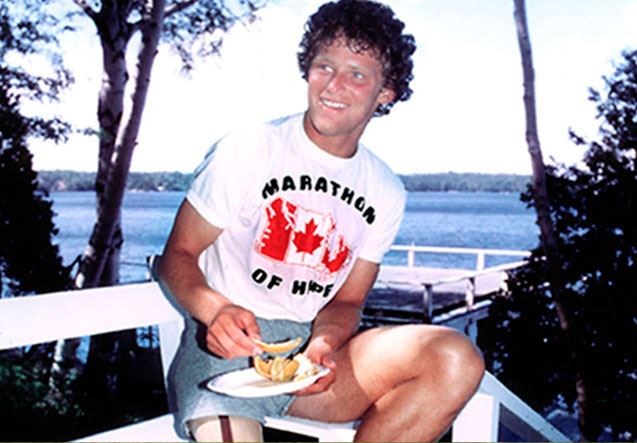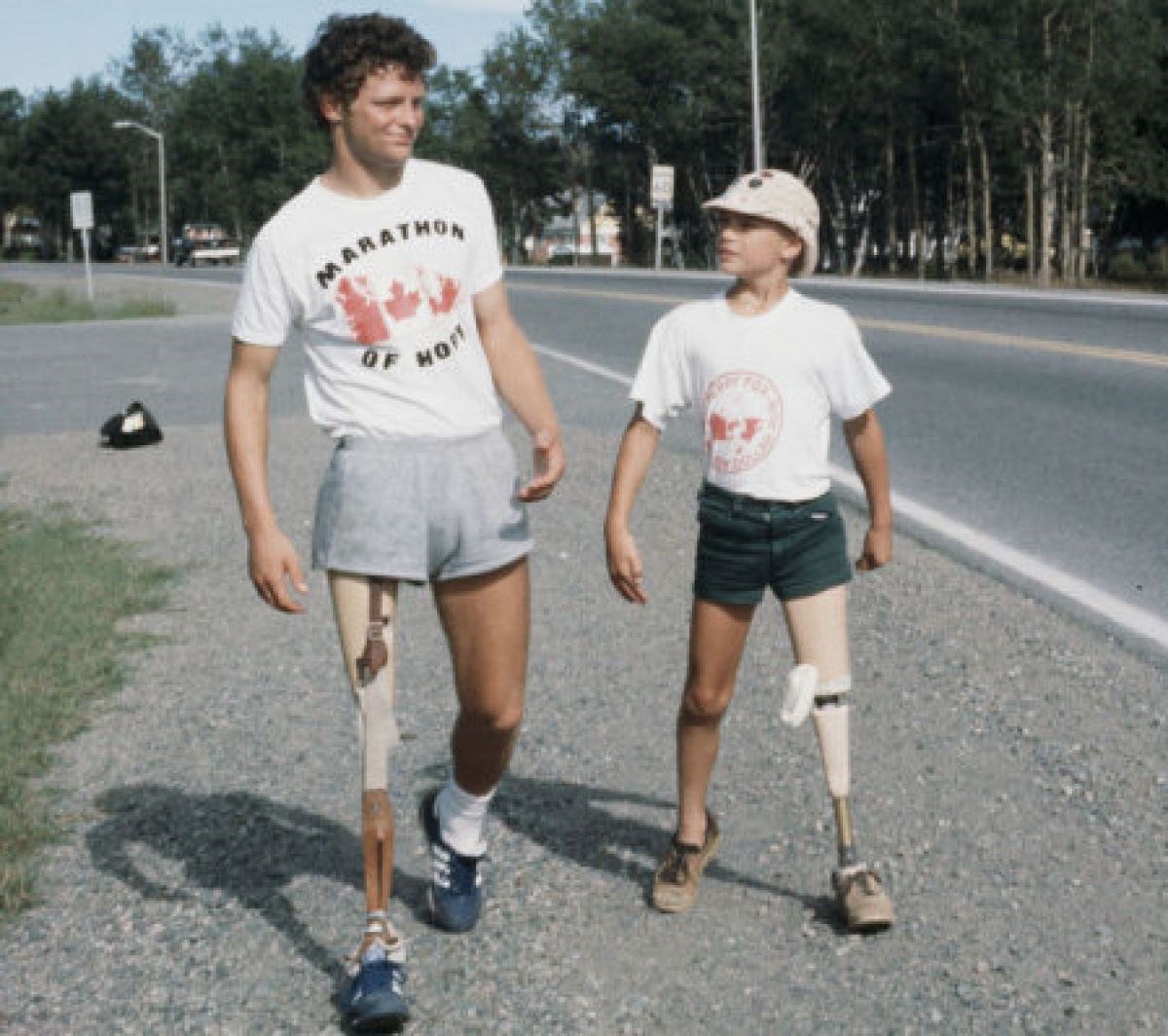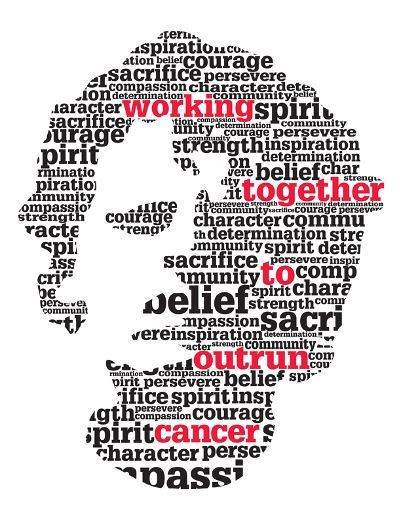“It took cancer to realize that being self-centered is not the way to live. The answer is to try and help others.”
 Terry taking a break during his runTerry Fox FoundationLeft-left-right, left-left-right, left-left-right, a sequence of steps sure to put any runner in the back of the pack. For Terry, however, it wasn’t about winning. Using this sequence of steps, Terry Fox undertook his transcontinental run across Canada (Terry Fox- ESPN, Youtube). Before it all began, however, doctors discovered malignant cancer in his right leg on March 9, 1977. Only one treatment remained to save his life: the amputation of his right leg. But after hearing the cries of children going through the horrors of cancer, Terry couldn’t walk out of the cancer ward and do nothing. Children’s pleas for help haunting his memory, Terry had all the motivation he needed to begin his trek. After months of training, despite doctor advice, and with inspiration from fellow amputee, Dick Traum, Terry announced his part in helping all those fighting cancer just as he had (Auerbach). On April 12, 1980 Terry Fox began his Marathon of Hope. Starting at the easternmost point in Canada, Terry ran 20-30 miles west every day, eyes set on the Pacific Ocean. He ran in the hope he’d raise one million dollars for cancer research, running thousands of miles on one leg and a metal prosthetic. If heroism is defined as concern for others above all else, and courage during adversity, Terry displayed this perfectly. Through his Marathon of Hope, the one-legged runner, Terry Fox, became the epitome of heroism, his actions displaying extreme selflessness and immense courage in spite of personal risk.
Terry taking a break during his runTerry Fox FoundationLeft-left-right, left-left-right, left-left-right, a sequence of steps sure to put any runner in the back of the pack. For Terry, however, it wasn’t about winning. Using this sequence of steps, Terry Fox undertook his transcontinental run across Canada (Terry Fox- ESPN, Youtube). Before it all began, however, doctors discovered malignant cancer in his right leg on March 9, 1977. Only one treatment remained to save his life: the amputation of his right leg. But after hearing the cries of children going through the horrors of cancer, Terry couldn’t walk out of the cancer ward and do nothing. Children’s pleas for help haunting his memory, Terry had all the motivation he needed to begin his trek. After months of training, despite doctor advice, and with inspiration from fellow amputee, Dick Traum, Terry announced his part in helping all those fighting cancer just as he had (Auerbach). On April 12, 1980 Terry Fox began his Marathon of Hope. Starting at the easternmost point in Canada, Terry ran 20-30 miles west every day, eyes set on the Pacific Ocean. He ran in the hope he’d raise one million dollars for cancer research, running thousands of miles on one leg and a metal prosthetic. If heroism is defined as concern for others above all else, and courage during adversity, Terry displayed this perfectly. Through his Marathon of Hope, the one-legged runner, Terry Fox, became the epitome of heroism, his actions displaying extreme selflessness and immense courage in spite of personal risk.
 Terry and child with amputated leg walking togetherurbanmoms.caA paragon of selflessness, Terry Fox placed this heroic trait above all else in his life. Using his memories of suffering children in the cancer ward as fuel, Terry pushed through any pain he encountered on his run. “There can be no reason for me to stop. No matter what pain I suffer, it is nothing compared to the pain of those who have cancer, of those who endure treatment” (Terry Fox Foundation). Terry Fox personally experienced how it felt emotionally, physically and mentally to undergo the pain of cancer. So when the pain of running a marathon every day on one leg brought him to tears, he remembered the cries of others as they embraced the release of death, and he kept on running, placing their pain above his own (Terry Fox Foundation). His selflessness gave him the strength to continue through any obstacle confronted, any pain encountered, any hardship faced, to be the hero all cancer patients needed. But beyond just pushing through pain, Terry made it explicit that the run was about others, not himself or his disability. “Fox himself was clear about his goals and that he did not want to be perceived as disabled. He said, ‘I was not going to let myself be used. There was only one thing I wanted to publicize and that was fundraising for cancer research’" (Chivers Sally). Terry Fox emphasized that his run was not about fame. He didn’t want to be seen as the famous man who ran across Canada while disabled. He wanted recognition as the man that ran across Canada to raise money for cancer research. Terry knew publicizing his disability would take the public eye away from the real purpose of the run and make it all about him, not others. So, he did all he could to publicize the run for cancer and not the run with a disability. His only goal was not fame and fortune, but rather to raise money for cancer and prove that cancer was not the end. An example to all, a savior to millions, Terry Fox was a hero through his selfless actions, but his courage set Terry apart from even the most selfless.
Terry and child with amputated leg walking togetherurbanmoms.caA paragon of selflessness, Terry Fox placed this heroic trait above all else in his life. Using his memories of suffering children in the cancer ward as fuel, Terry pushed through any pain he encountered on his run. “There can be no reason for me to stop. No matter what pain I suffer, it is nothing compared to the pain of those who have cancer, of those who endure treatment” (Terry Fox Foundation). Terry Fox personally experienced how it felt emotionally, physically and mentally to undergo the pain of cancer. So when the pain of running a marathon every day on one leg brought him to tears, he remembered the cries of others as they embraced the release of death, and he kept on running, placing their pain above his own (Terry Fox Foundation). His selflessness gave him the strength to continue through any obstacle confronted, any pain encountered, any hardship faced, to be the hero all cancer patients needed. But beyond just pushing through pain, Terry made it explicit that the run was about others, not himself or his disability. “Fox himself was clear about his goals and that he did not want to be perceived as disabled. He said, ‘I was not going to let myself be used. There was only one thing I wanted to publicize and that was fundraising for cancer research’" (Chivers Sally). Terry Fox emphasized that his run was not about fame. He didn’t want to be seen as the famous man who ran across Canada while disabled. He wanted recognition as the man that ran across Canada to raise money for cancer research. Terry knew publicizing his disability would take the public eye away from the real purpose of the run and make it all about him, not others. So, he did all he could to publicize the run for cancer and not the run with a disability. His only goal was not fame and fortune, but rather to raise money for cancer and prove that cancer was not the end. An example to all, a savior to millions, Terry Fox was a hero through his selfless actions, but his courage set Terry apart from even the most selfless.
 Terry as described by wordshhcarnegieps.comDespite the risk so obvious in running while recovering from cancer, Terry did what he knew what was right, regardless of consequences. Unwavering in his decision to run for the fight against cancer, Terry wanted nothing more than to help, even when facing death for a second time. “I’ve said to people before that I’m going to do my very best to make it, I’m not going to give up. But I might not make it… if I don’t, the Marathon of Hope better continue” (Terry Fox Foundation). Terry began running after his cancer treatment even though his cancer could return quickly. Ignoring this risk and the advice of medical professionals, he went on to run regardless. He didn't care that the run might kill him. Terry only cared that there were people in need, and he could help. Sadly, his cancer did return 143 days into his run, and he died 6 months later. (Terry Fox Contemporary). Even with this great personal risk, he ran, making him a hero. The return of his cancer wasn’t sudden. His health was obviously failing the final days of his run. Notwithstanding these signs, Terry pushed on through all pain and weakness, knowing if he stopped he may never return. “Terry hadn't been feeling well for the previous two or three days, but he wasn't about to quit. While running that final day, Terry recalled, ‘There was hardness of breath. I was coughing. I started to choke, I didn't know what was going on.’ Even though he experienced extreme pain, he kept on running” (Terry Fox Contemporary). Terry had known from the start that the running would be dangerous. The weather could be life-threatening, his body worn by cancer, the entire journey could be pain every step for 1000’s of miles. In spite of this risk he embarked on this courageous journey. Even with the inability to breathe effectively, inability to feel anything but pain, and the absolute right to stop after doing the unimaginable of getting this far, Terry endured. His life was at risk with the return of his cancer and yet, unrelenting, he persisted through extreme personal risk. He valued the lives of all those with cancer above his own well-being. He did what was right despite all the risks to his life and later loss of it. These actions gave Terry the title of hero and the undeniable right to it.
Terry as described by wordshhcarnegieps.comDespite the risk so obvious in running while recovering from cancer, Terry did what he knew what was right, regardless of consequences. Unwavering in his decision to run for the fight against cancer, Terry wanted nothing more than to help, even when facing death for a second time. “I’ve said to people before that I’m going to do my very best to make it, I’m not going to give up. But I might not make it… if I don’t, the Marathon of Hope better continue” (Terry Fox Foundation). Terry began running after his cancer treatment even though his cancer could return quickly. Ignoring this risk and the advice of medical professionals, he went on to run regardless. He didn't care that the run might kill him. Terry only cared that there were people in need, and he could help. Sadly, his cancer did return 143 days into his run, and he died 6 months later. (Terry Fox Contemporary). Even with this great personal risk, he ran, making him a hero. The return of his cancer wasn’t sudden. His health was obviously failing the final days of his run. Notwithstanding these signs, Terry pushed on through all pain and weakness, knowing if he stopped he may never return. “Terry hadn't been feeling well for the previous two or three days, but he wasn't about to quit. While running that final day, Terry recalled, ‘There was hardness of breath. I was coughing. I started to choke, I didn't know what was going on.’ Even though he experienced extreme pain, he kept on running” (Terry Fox Contemporary). Terry had known from the start that the running would be dangerous. The weather could be life-threatening, his body worn by cancer, the entire journey could be pain every step for 1000’s of miles. In spite of this risk he embarked on this courageous journey. Even with the inability to breathe effectively, inability to feel anything but pain, and the absolute right to stop after doing the unimaginable of getting this far, Terry endured. His life was at risk with the return of his cancer and yet, unrelenting, he persisted through extreme personal risk. He valued the lives of all those with cancer above his own well-being. He did what was right despite all the risks to his life and later loss of it. These actions gave Terry the title of hero and the undeniable right to it.
Through the selfless actions of Terry Fox and his extreme courage, millions of lives were changed by this one-legged runner. Terry’s selflessness gave him the strength to push through any obstacle and conquer any pain in the name of all cancer patients. His unrelenting courage in the face of death and the placing of other’s lives before his own gave him the ability to continue the Marathon of Hope. His heroic example is an inspiration to all. “Every year, millions of people in close to 25 countries participate in Terry Fox Runs and Terry Fox fundraising events, to date over $700 million [has] been raised for cancer research” (Terry Fox Foundation). The life Terry lived and the sacrifice of it for others truly left a mark on the world. Millions of people honor his run each year. Millions of people give to cancer research in Terry’s name. A foundation named after the extraordinary man leads the world in cancer research funding (Terry Fox Foundation). Terry Fox still shines as a beacon of light to the millions of cancer patients in the dark shadow of death. The hope he brings into a world too often filled with despair is undeniable. A quintessential example of perseverance to all who knew him, a savior to millions of cancer patients worldwide, and an inspiration to the world, Terry Fox embodies heroism, having led a life selflessness and courage.
Works Cited
Auerbach, Michael P. "Terrance Fox." Terrance Fox, Mar. 2009, p. 1. EBSCOhost, search.ebscohost.com/login.aspx?direct=true&db=b6h&AN=36910199&site=brc-live.
Chivers, Sally. "Ordinary People: Reading the Transcanadian Terry Fox." Canadian Literature, no. 202, Sept. 2009, pp. 80-94. EBSCOhost, search.ebscohost.com/login.aspx?direct=true&db=lfh&AN=47575182&site=ehost-live
dannyphoenix. “Terry Fox - ESPN.” YouTube, YouTube, 30 Mar. 2008, www.youtube.com/watch?v=xjgTlCTluPA.
“Facts About Terry.” The Terry Fox Foundation, www.terryfox.org/terrys-story/facts/.
"Terry Fox." Contemporary Heroes and Heroines, vol. 1, Gale, 1990. Biography In Context, https://link.galegroup.com/apps/doc/K1607000096/BIC?u=powa9245&sid=BIC&xid=19ad1e07. Accessed 29 Mar. 2018.
“The Marathon of Hope.” The Terry Fox Foundation, www.terryfox.org/terrys-story/marathon-of-hope/.
Page created on 4/18/2018 7:25:10 PM
Last edited 8/25/2018 8:15:44 PM
